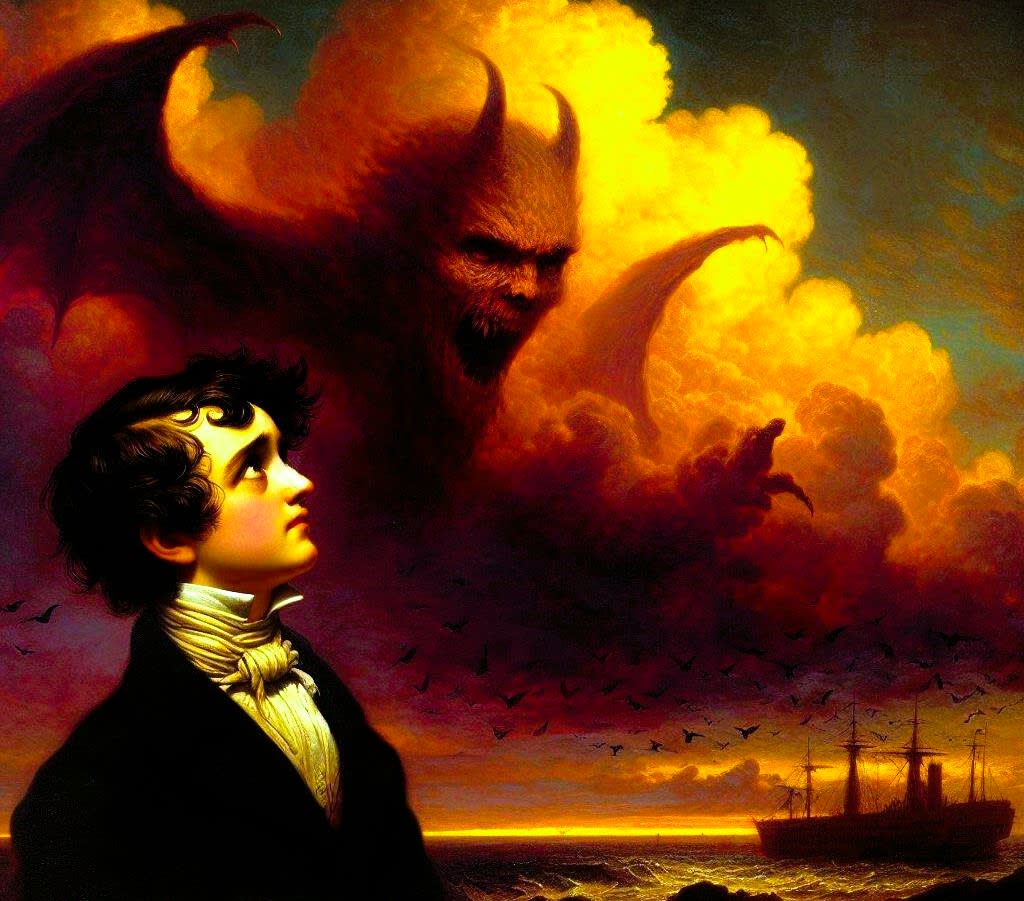
Education is not what it was when I was a lad. These young people are rather wild, untamed. They are cruel, selfish, prone to deception and betrayal. It is almost as if, when I was young, we were all tacitly cooperating; now, in this bold, nineteenth century, they seem to be at odds in a rather Hobbesian, red of tooth and claw world. Some of my colleagues find them disgusting or ridiculous. I must confess, though I am somewhat embarrassed to do so, that I find most of them rather frightening.
When I came upon a few of them fighting in the yard today, I swallowed that fear, scolded the assailants and tried to protect the victim. I recognized him from my Latin class: a new arrival, the son of a merchant from Richmond, Virginia. A visitor from a new world. When I drove the ruffians (Churchfield and Simpson, both beasts who only recently stopped walking on their knuckles) away, I looked him over. His nose was bloodied, and some of the claret had dripped onto his shirt. His coat was of good quality, though he swam in it, and his hair was a dark storm about his temples. His dark eyes burned with indignation.
I said, “Never mind those fools, lad. Are you alright, then?” I was about to apply my handkerchief to his nose, but thought better of it when he glared at me. I would have done so without a second thought had he been any of the other children, but his glare was that of an insulted aristocrat in middle age, not that of a school boy. I was startled for a moment, but folded the handkerchief and proffered it in a deferential way; I practically bowed when I did so.
“Please, sir: may I have something to read?” he asked. His fellows would have asked for a sweet, or a drink of water, in a similar tone. Never had I heard any pupil ask for something to read; most spent their time scheming to avoid reading and survive their classes in one piece. I felt something for the lad at that moment, and it was not pity. I recognize it now as respect.
“I’ve nothing with me just now, lad, but if you come to my office yonder, I’ve a great many books I would be pleased to share with you. Have you any Greek?” He was applying my handkerchief to his reddened beak. He looked disappointed that I hadn’t a library in my pocket, but he nodded and we made our way through the drowsy sun of afternoon to my office door. I could hear him grumbling about the apes who had bloodied him as we walked. Seldom had I heard one so young call his peers, “shocking idiots.”
“Forgive me, sir. I have only a little Greek, but my Latin is coming along. Do those boys pick on every stranger they see?” he asked. I hustled him into my office and closed the door behind us. I was a bit embarrassed by the smell of my pipe, which shoved us both about a bit when we walked in. I oughtn’t to smoke it in my office, but that aroma is an old friend to me, even if it is a bit embarrassing when strangers come calling. I nodded and pulled a volume of the poems of Catullus from the shelf beside the door and handed it to the boy.
I smiled at him. “They do what their nature bids, and their nature is wild and in need of civilization just now. If they trouble you again, look for me.” I reached for the water jug on the sideboard next to my desk and filled two glasses. Had he been old enough to own that glare he'd fixed on me earlier, I would have given him whiskey from the bottle patiently awaiting the end of my day in my desk drawer.
“Catullus! Oh, I have missed him. Thank you, sir!” The boy beamed as if his mother had handed him something warm and sugary from the oven. He touched the book to his forehead, like a monk on some penitent’s walk. I stooped to pick up my handkerchief, which he had discarded to love the book. Had he been any other boy, I would have admonished him to pick it up himself.
“Which do you like best?” I gestured at the book.
He leafed through it methodically for a moment and read: “Ōdī et amō. Quārē id faciam fortasse requīris. Nesciŏ, sed fierī sentiō et excrucior.” His eyes closed, and he savored the aroma of the old page for a moment. What a remarkable lad, I thought. How lonely he must be, in the present.
“How would you translate that?” I pointed to the chair in front of my desk. He took my chair instead. I did not protest; I meekly took the seat opposite, and sipped from my glass.
“I hate and I love. Why I do this, perhaps you ask. I know not, but I feel it happening and I am tortured,” he said. He put the slender volume down on my desk and sighed. He lifted a boot onto my desk. There was mud on it; not banal schoolyard mud, but beach mud: saline and ponderous. He’s a student of the sea, I thought.
“An elegant translation, not marred at all by your American accent. Why do you cherish that one, in particular?” I pulled my watch from my pocket and consulted it. We would have to get on with the afternoon’s petty pace soon enough. I kept quiet about time, for I wanted him to feel better, and recover his courage. Simpson and Churchfield would step on his shadow and snicker in the hallway soon enough.
“Reading Catullus makes me feel more inclined to love, but most of the time I am hot with hate. Thinking with his head makes mine feel less strange. Do you ever feel like you’re not like other people?” He held my gaze, somewhat imploringly.
“Aye, and mostly, I am glad of it.” I clinked his glass with mine and grinned. “Other people are generally put into our path for educational purposes. The majority are just counter-examples or cautionary tales with feet and elbows. Hate? Do not squander your energy.”
He thought that over. He turned slowly and looked out of the window behind my desk. He read the sky as he had Catullus. “What do you see, when you look at that cloud, sir?” He was not at play. It was a serious, probing question.
“By lakes and sandy shores, beneath the crags/Of ancient mountain, and beneath the clouds/Which image in their bulk both lakes and shores/And mountain crags; do you know Coleridge, my boy? It is lovely, the way clouds image ordinary things in their pale cotton. That one looks a bit like a bear to me. And you? What do you see?” His nose had stopped leaking. I wondered what he might look like with a moustache.
A shadow crawled over his pale, melancholy countenance. “A demon, sir. I am sorry you do not see it. I think Catullus, or Dante, or Coleridge would have seen it. I’m afraid my eyes are wrong.” He pushed his fingers through the tempest of his curls.
“Untimely, perhaps—not wrong. There are worse things to be than better suited to a nobler time, my boy.” I stood up slowly. “Keep that book. Come and talk with me again soon.”
“I will do that, sir. Thank you.” He claimed the book and followed me to the door. I opened it for him. Looking down at his mad, dark locks, I thought for a moment of the feathers of a raven. I followed him, somewhat reluctantly, into the present.
----------------------------------------------------------------------------------------
Nota Bene: This story was prompted by the inimitable Randy Brown's contest; the details can be found here:
Per his instructions, I ought to make it clear that this story was inspired by the poem "Alone," by Edgar Allan Poe. It can be found here:
The narrator, young Poe's kindly, Scottish teacher, recites from Samuel Taylor Coleridge's "Frost at Midnight," which can be found here:
Edgar reads from the work of the Roman poet, Catullus:
About the Creator
D. J. Reddall
I write because my time is limited and my imagination is not.






Comments (5)
Beautifully told.
I enjoyed this one very much. Thanks for taking part in the challenge.
“I hate and I love. Why I do this, perhaps you ask. I know not, but I feel it happening and I am tortured,” Gosh I loved that so much! I reread that line so many freaking times. It hit me so hard. Loved your take on this challenge!
Wonderful. Beyond deftly done. I was fully immersed in this.
The way you kept the characters dialog in the proper era was masterful. Well written D.J.